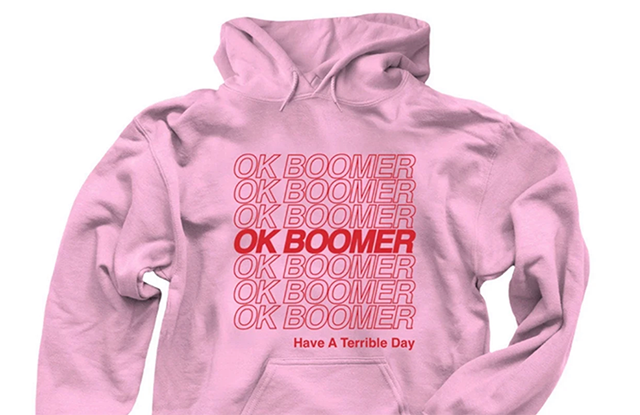OK, Boomer
The confusing comeback that kindled conflict between Gen Z and Baby Boomers
Conflict between older and younger generations has been a constant problem for decades, but in recent years, tensions between Millennials and Baby Boomers have led to turmoil for everyone involved, and now Gen Z. While Baby Boomers have called younger generations “snowflakes” as a way to personify the increased sensitivity of youth towards serious issues, comparisons can now be made between “snowflake” and a new phrase from Gen Z.
“OK, Boomer” is a phrase coined by members of Gen Z that is currently driving the adult world crazy. Like other trends that youth follow, adults are trying to figure out what “OK, Boomer” means, why kids say it, and how to react.
As the entire world grapples with serious issues like terrorism, climate change, and corruption, a whole generation is left young, seemingly helpless, and lost. Generation Z is made up of kids ranging from 9 to 24, whose parents are mostly Gen X, have never lived in a world without the internet or phones, and feel like they have no voice. Generally, Gen Z is characterized by sarcastic humor, fast-paced social environments, anxious lifestyles, and a want for change.
Whitney Price (12) feels similarly to seemingly most Gen Z, but explained, “Although I’m in Generation Z, I have felt criticized by older generations, specifically, Baby Boomers. And I think “OK Boomer” is just a joke that adds comedic relief to the excessive criticism. It’s honestly harmless and funny!”
Gen Z’s coping mechanism is technology and humor, leaving many adults confused.
Now that OK, Boomer has come around, targeted at older generations, many adults, parents, and grandparents aren’t sure how to react. StayHipp explained, “In addition to just “boomer,” the phrase “ok boomer” can be used to dismiss something that someone says. It can be spoken to an actual boomer, or a younger person to draw the comparison. It’s a ubiquitous response to someone who is expressing an outdated or close-minded worldview.”
While some Gen Z view it as a comeback to older generations for their political comments and “old school” mentality, other Gen Z view it as purely a joke. Sometimes, “OK, Boomer” can be used as a way to say that what you did or said wasn’t okay, or as a sly response to an annoying comment.
The odd phenomenon with this phrase actually came into light in late October, when newspapers like The New York Times and Mother Jones headlined “OK, Boomer,” spurring a storm of responses.
Ironically, most of the articles written about this phrase were written by people who would be labelled as “boomers,” and a lot of their commentary and terminology used while discussing the issue would ensue an “OK, Boomer” comment from a Gen Z’er. For example, an opinion article published by Kevin Drum on Mother Jones criticized youth for being sensitive and over dramatic, even stating “I suppose the answer to all this is ok boomer. Fair enough. But the fact remains that Gen Z-ers just aren’t as bad off as they like to think they are.”
The bizarre thing about “OK, Boomer” is that many adults are seriously upset over this issue, but don’t fully understand what it actually means. However, this seems to empower Gen Z to use the phrase more, simply because it gets a reaction.
Megan Rushing (10) told us, “I think it’s hilarious, but I showed an ‘OK Boomer’ meme to my parents and they yelled at me.”
Bob Lonsberry, a conservative radio host, deleted a tweet from Nov. 4 stating: “‘Boomer’ is the n-word of ageism. Being hip and flip does not make bigotry ok, nor is a derisive epithet acceptable because it is new.”
Several other articles explain the trend by attributing it to Millenials, people who are mostly parents or in their thirties, rather than the kids who created the phrase, who are mostly in high school or college.
To find out how youth feel about this issue, WSS posted a poll on Instagram asking youth about “OK Boomer”, with 182 views and approximately 83 responses, all from members of Generation Z, the results were interesting. While many Gen Z’ers consider the phrase as just a joke, there was a good handful that viewed it as going too far.
The first question we asked was “Is ‘OK Boomer’ more of a joke or a serious comeback?” Approximately 27 percent of responses stated that the phrase was serious, where roughly 73 percent stated it was simply a joke. The second question was “Do you think ‘OK Boomer’ has gone too far or is disrespectful?” Out of 83 responses, 78 percent of those in the survey believe it hasn’t gone too far, whereas 22 percent believe it has.
Finally, we also left a space for open responses on the topic. Ironically, a good portion of the responses were some kind of iteration of “OK, Boomer” in this section.
Jenna Bauer (9) views the phrase in a way that many people from older generations do and stated: “I think ‘OK Boomer’ is a way for people to say ‘oh well I don’t really care what you think, what matters is what I think.’”
It would appear that everyone is somewhat conflicted about the use of this new slang, unsure of what its impact will be. Overall, it seems like, regardless of how people feel about it, Gen Z isn’t going to stop using it. As a matter of fact, in perfect Gen Z fashion, they view it as funny and just don’t care. While the fascination surrounding this topic is interesting, to most kids, “OK, Boomer” is just another joke that could easily wash away in a few months, or it could have legitimate impacts of generational conflict in the future.

I would like to go into English Literature and Political Science and eventually become a professor. I am a three-year debate student who is way too busy....








